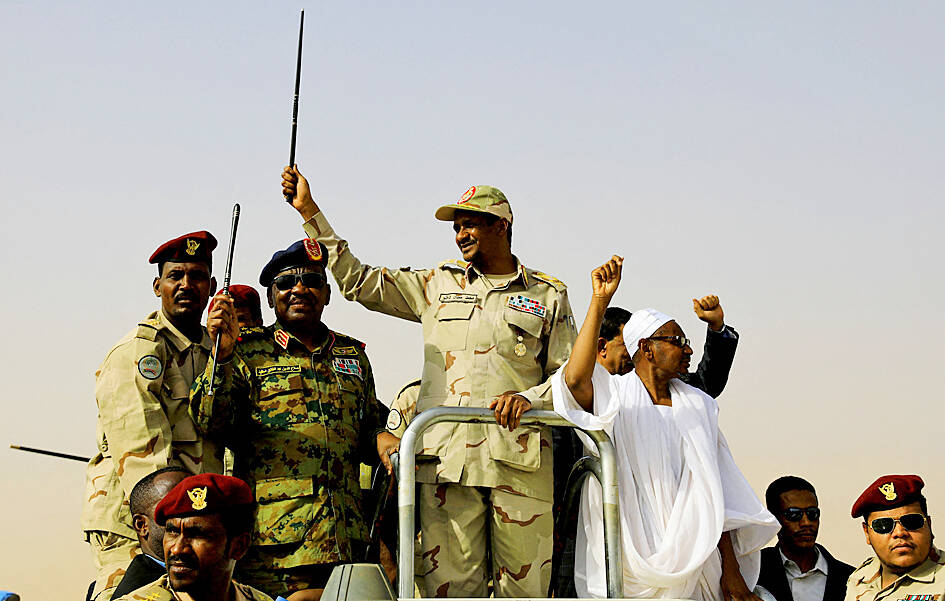The paramilitaries fighting the Sudanese army over the past six months have advanced and sought to consolidate their reach in the capital in recent weeks, eyewitnesses told Reuters.
Fighting between the Sudanese army and the paramilitary Rapid Support Forces (RSF) erupted on April 15 over tensions linked to a planned transition to civilian rule. It has devastated the Sudanese capital of Khartoum and sparked ethnically driven attacks in Darfur.
Months after mediators suspended negotiations, there appears to be no clear winner and no end in sight to a war that has displaced more than 5.75 million people, killed thousands and destroyed major cities.

Photo: Reuters
The RSF quickly took control of Khartoum and residents have accused it of looting and occupying homes. The army, which has maintained control of its bases, has launched major airstrikes and artillery fire.
The RSF has now appeared to attempt to move southward, towards Gezira state, a key agricultural area and population center. Hundreds of thousands of people, as well as some government and humanitarian functions displaced from Khartoum, have moved there.
Last week, the RSF took control of Ailafoun, a major town on one of the routes to Madani, and they looted and displaced thousands of residents, with many fleeing on foot, eyewitnesses said.
“The attack was so strong that the army soldiers finished their ammunition and had to run back to their base,” said Amna, one of those who fled.
ADVANCE CONTINUES
The force has also continued with fierce attacks on Nyala and el Obeid to the west of the capital that began soon after the outbreak of war.
The army says its soldiers, and particularly its special forces units, are fighting back the advances.
Within Khartoum, the RSF has launched attacks on several army bases, including the main army headquarters and the armored corps base.
Across the Nile in Omdurman, eyewitnesses said the RSF has been using long-range artillery, previously out of reach for the paramilitary group, to attack the crucial Wadi Sayidna air force base.

Kehinde Sanni spends his days smoothing out dents and repainting scratched bumpers in a modest autobody shop in Lagos. He has never left Nigeria, yet he speaks glowingly of Burkina Faso military leader Ibrahim Traore. “Nigeria needs someone like Ibrahim Traore of Burkina Faso. He is doing well for his country,” Sanni said. His admiration is shaped by a steady stream of viral videos, memes and social media posts — many misleading or outright false — portraying Traore as a fearless reformer who defied Western powers and reclaimed his country’s dignity. The Burkinabe strongman swept into power following a coup in September 2022

‘FRAGMENTING’: British politics have for a long time been dominated by the Labor Party and the Tories, but polls suggest that Reform now poses a significant challenge Hard-right upstarts Reform UK snatched a parliamentary seat from British Prime Minister Keir Starmer’s Labor Party yesterday in local elections that dealt a blow to the UK’s two establishment parties. Reform, led by anti-immigrant firebrand Nigel Farage, won the by-election in Runcorn and Helsby in northwest England by just six votes, as it picked up gains in other localities, including one mayoralty. The group’s strong showing continues momentum it built up at last year’s general election and appears to confirm a trend that the UK is entering an era of multi-party politics. “For the movement, for the party it’s a very, very big

ENTERTAINMENT: Rio officials have a history of organizing massive concerts on Copacabana Beach, with Madonna’s show drawing about 1.6 million fans last year Lady Gaga on Saturday night gave a free concert in front of 2 million fans who poured onto Copacabana Beach in Rio de Janeiro for the biggest show of her career. “Tonight, we’re making history... Thank you for making history with me,” Lady Gaga told a screaming crowd. The Mother Monster, as she is known, started the show at about 10:10pm local time with her 2011 song Bloody Mary. Cries of joy rose from the tightly packed fans who sang and danced shoulder-to-shoulder on the vast stretch of sand. Concert organizers said 2.1 million people attended the show. Lady Gaga

SUPPORT: The Australian prime minister promised to back Kyiv against Russia’s invasion, saying: ‘That’s my government’s position. It was yesterday. It still is’ Left-leaning Australian Prime Minister Anthony Albanese yesterday basked in his landslide election win, promising a “disciplined, orderly” government to confront cost-of-living pain and tariff turmoil. People clapped as the 62-year-old and his fiancee, Jodie Haydon, who visited his old inner Sydney haunt, Cafe Italia, surrounded by a crowd of jostling photographers and journalists. Albanese’s Labor Party is on course to win at least 83 seats in the 150-member parliament, partial results showed. Opposition leader Peter Dutton’s conservative Liberal-National coalition had just 38 seats, and other parties 12. Another 17 seats were still in doubt. “We will be a disciplined, orderly